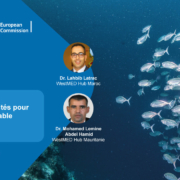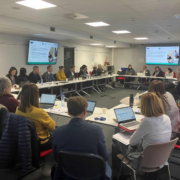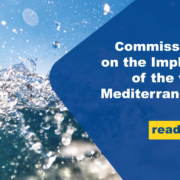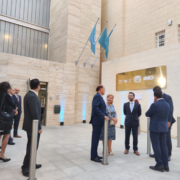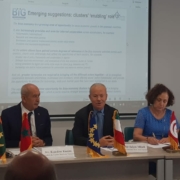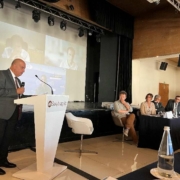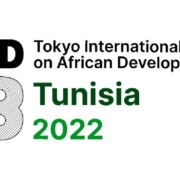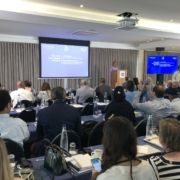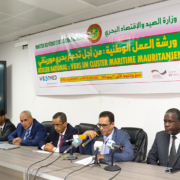Dans le cadre de l’initiative WestMED, le hub National de la Mauritanie, en étroite coordination avec le Ministère des Pêches et de l’Economie Maritime a organisé le lundi 27 juin 2022, à l’hôtel de Nouakchott, un atelier national dédiée à la discussion de l’opportunité de créer un cluster maritime mauritanien. Cette importante rencontre, présidée par le Secrétaire Général du Ministère des Pêches et de l’Economie Maritime et en présence des secrétaires Généraux du Ministère de l’Environnement et du Développement Durable et du Ministère du Pétrole, des Mines et de l’Energie, fait suite au webinaire organisé le mardi 27 juillet 2021 et s’inscrit dans le cadre de « WestMED in my country ».
Ont pris part à cette conférence, en plus du hub national de la Mauritanie et du coordinateur national de l’initiative WestMed en Mauritanie, des représentants des principales institutions nationales concernées, des représentants du secteur privé, des organisations socio-professionnelles et de la société civile, des représentants des principales institutions de la recherche scientifique au niveau national, Monsieur Matteo Bocci de l’équipe technique de l’initiative WestMED et Mme Amna Soholji, Secrétaire Générale du Cluster Maritime Tunisien.
Lors de cet atelier, les participants ont suivi trois exposés : le premier a été fait par M. Matteo Bocci (expert Ecorys) et a concerné la présentation des types et pratiques existants des clusters maritimes et une analyse de leur potentiel pour stimuler une croissance durable et des emplois dans le bassin méditerranéen. Le deuxième, fait par Mme Amna Sohlobji, Secrétaire Générale du Cluster Maritime Tunisien est relatif à l’expérience du cluster tunisien. En fin, le troisième exposé, fait par Dr. Mohamed Lemine Abdel Hamid du Hub National de la Mauritanie, a été focalisé sur la présentation des principaux éléments de réflexion, issus d’un benchmarking, relatifs à la création du cluster maritime mauritanien.
A l’issue de ces exposés, un débat riche a été ouvert entre les participants. Au cours de ce débat, les participants ont jugé nécessaire le démarrage immédiat du processus de création du cluster maritime mauritanien. Ainsi, un comité technique ad hoc (de 10 personnes), composé des représentants des principales institutions publiques, de la recherche scientifique, des organisations socioprofessionnelles et de la société civile, et des opérateurs économiques a été désigné par les participants et dont la mission est de proposer les modalités pratiques pour la création du cluster (format, composition, aspects juridiques, etc.). Ce comité devra achever son travail d’ici fin octobre 2022. Le deadline pour la création du cluster maritime mauritanien est fixé pour fin 2022. Dans ce cadre, les participants ont souligné la nécessité de l’assistance technique et financière de l’initiative WestMED et des partenaires techniques et financiers de la Mauritanie pour accompagner le processus du cluster maritime.
Notons que la réunion a été marquée par une couverture médiatique très importante, avec la présence de tous les organes de la presse officielle nationale (Agence Mauritanienne d’Information, Télévision Nationale Al Mauritaniya, radio de Mauritanie), des télévisions privées et des plateformes de la presse Internet (Al Minasa, El Moubasher Bi El Hassaniya, Agence Nabaa, Agence Azougui). L’évènement a été présenté parmi les éléments principaux dans le journal d’information des chaines officielles et privées en français, en arabe et en langues nationales, diffusés dans la soirée du 27/06/2022. De même, des extraits des discussions ont été diffusés en direct sur Facebook. Les agences d’information publiques et privées ont également diffusé des interviews en français et en arabe avec le responsable du Hub National (Dr. Mohamed Lemine Abdel Hamid). Lors de ces interviews le responsable du HN a présenté l’initiative WestMED, et les objectifs et les résultats attendus de l’organisation de l’atelier, et a souligné que l’atelier d’aujourd’hui constitue un pas important vers la concrétisation de la création d’un cluster maritime mauritanien.
Téléchargez la présentation par Dr. Mohamed Lemine Abdel Hamid : Eléments de réflexion relatifs à la création d’un Cluster maritime mauritanien
Pour plus d’informations contactez: mauritania@westmed-initiative.ec.europa.eu

